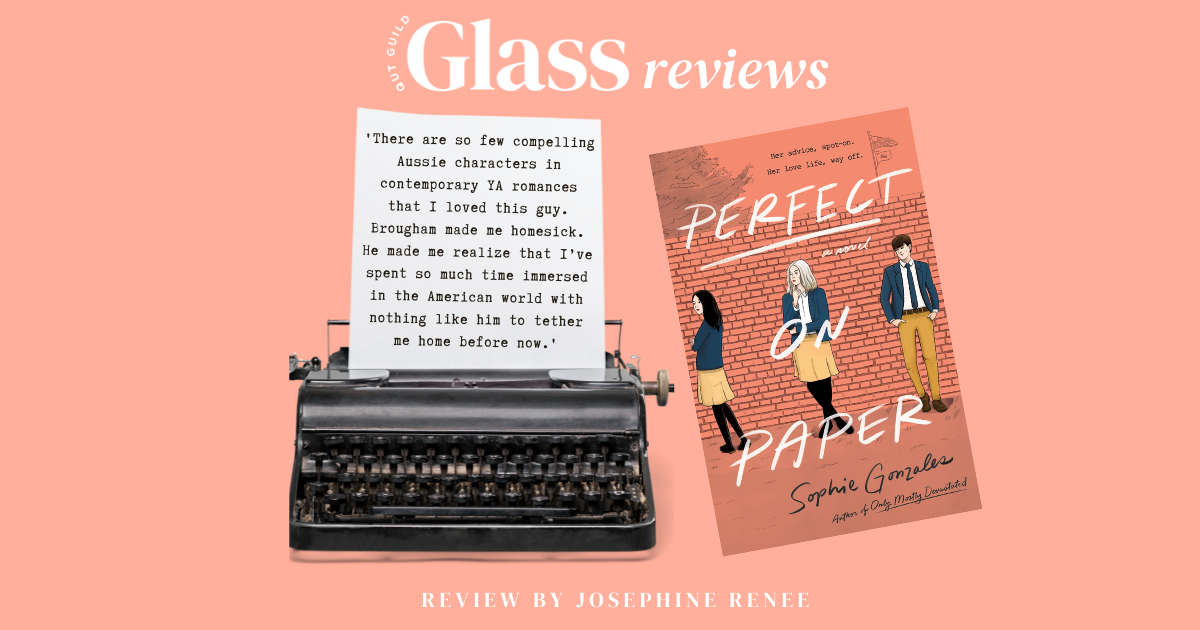Review by Josephine Renee
– Does Perfect on Paper handle important relationship issues? Yes.
– Are queer and questioning themes discussed at length? Absolutely.
– And is there an Aussie nestled into the love triangle of this American high school teen drama? Bloody oath.
It’s perfect, on paper.
Perfect on Paper (2021) follows Darcy Phillips, who runs an anonymous love advice service from locker 89. Envelopes with questions and a ten-dollar note are slotted into the locker, the recipient later receives an email response from locker89@gmail.com. Her scheme is going well, until our leading legend Australian discovers her secret identity, and contracts – *cough* blackmails *cough* – Darcy into helping him get back together with his ex.
A lot happens in Perfect on Paper, with friends, family, and love interests. Relationships are hard, especially at that age. So, anonymous relationship advice is a booming enterprise, (which the Netflix show Sex Education proves). It makes sense when you know that the author Sophie Gonzales is a psychologist. The advice is spot on, despite Darcy never having been in a relationship. It includes things that I wish I’d heard at that age, from different attachment styles, to how real commitment-phobes behave, to consent and comfortability with saying ‘no’ no matter how long it’s been, as well as the difference between asexuality and being aromantic. In these cases, she usually refers them to the QnQ Club.
QnQ, Queer and Questioning, is a group that Darcy is a part of in her school. It plays a major role in relieving her struggles with internalized biphobia. As she’s never been in a relationship with a woman, and now she’s entering a relationship with a cisgender straight guy, she worries that this strips her of being queer and she won’t belong in the group anymore. But the entire QnQ Club chorus ‘you’re queer,’ accepting her, and understanding that they too have dealt with these phobias that are not exclusive to bisexual people – the club does discuss some deep stuff, it’s not all about how gay Chad and Ryan are for each other in I Don’t Dance.
Now we come to the best part, that I feel forgives all the YA drama and the locker 89 ethically questionable secrete identity capable of messing up other’s relationships for your own gain: Broughman. Dude reminded me that Australia has a culture that’s more than beer and vegemite – well, beer and beer byproducts. Gonzales uses the setting of the United States to introduce and explain Australian culture naturally through Brougham, and to have a real discussion with the reader on influence. There’s a line from Broughman that hits home hard: ‘No, I swear, your stuff is good! But before I was saying how fun it was to move here, because we get all of your media. And the thing is, we get all of yours and you get so little of ours, and honestly you’re missing out.’
Brougham says things like ‘numpty’, discusses swimmers, togs, and bathers, fairy bread with hundreds-and-thousands, and he talks about how the school settings are so different; cafeterias with trays, verses canteens and eating outside on the grass with food in your lap. After this crash course in Aussie culture there’s a text exchange between them:
Darcy: Am I Australian now?
Brougham: You’re Australian when you instinctively yell “Alice? Who the fuck is Alice?” and “No way, get fucked, fuck off” at the right moments at the pub. Until then you’re a welcome visitor.
Darcy: I am … so confused right now
Brougham: Good
There is an undeniable appeal to reading about an Aussie making an American mortified or confused.
I’m bisexual, and there aren’t many bisexual characters done well, and although I loved seeing that, I felt so much more represented by reading about an Australian. There are so few compelling Aussie people in contemporary YA romances that I loved this guy. Brougham made me homesick. He made me realize that I’ve spent so much time immersed in the American world with nothing like him to tether me home before now.
It wasn’t until the acknowledgements that I found out that Gonzales is Australian, immediately explaining why she can write a well-rounded great Aussie like Brougham. American reviewers have commented that there are a few lines that alert you to the fact that this is an Australian writing about America, (which I believe would never happen if she wrote a book that was set in Australia). In the acknowledgements, Gonzales talks about how special sharing Australian culture with an international readership was for her and thanks her publishing team at Hachette for bringing her books to her home country. She obviously enjoyed writing Brougham and bringing him back to us, and I want more! More Broughams, female Broughams, Australians that are queer, questioning, and bisexual numpties.
Gonzales will release a second book in 2022, and I’m hopeful for a good, funny, loveable, and LGBTQIA+ Australian novel to drop on my doorstep. Until then, I’ll be re-reading Gonzales’s Perfect on Paper as the closest thing to it. You can never have enough expert advice, and the portrayal of the main protagonist as bisexual is the best I’ve seen. The discussions that take place in the novel about biphobia can’t be ignored. But I’ll mostly re-read it for the Aussie rep, Brougham, and to hear him reference the c-word and its multiple uses.
Josephine Renee (she/her) is a 21-year-old feminist, queer, Brisbane author who has recently returned from a year and a half spent traversing North America. She is soon to travel Europe with an extended stay in Paris. When not gaining novel worldbuilding inspiration she dedicates her time to writing and illustrating, with a web-comic Horn-Nhei and can be found on Instagram @josephine_renee_official.







